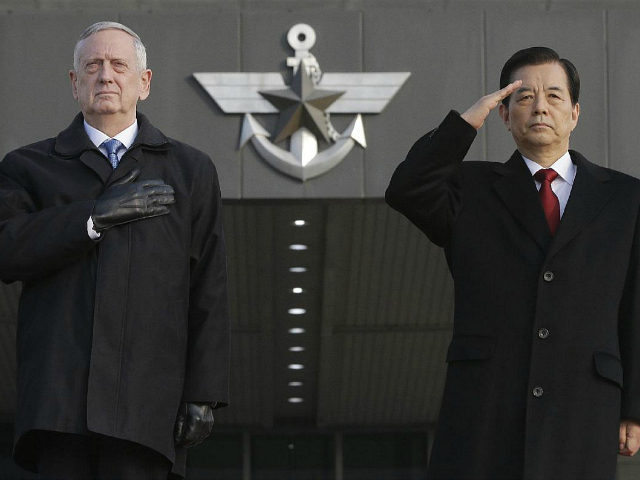Secretary of Defense James Mattis arrived in South Korea Tuesday to meet his counterpart in and acting president Hwang Kyo-ahn in Seoul. Mattis affirmed the White House’s support for the “very strong, trusted relationship” between America and South Korea and voiced his support for a U.S. missile defense system meant to protect against a North Korean attack.
The Terminal High Altitude Area Defense (THAAD) system is meant to protect Seoul from ballistic missiles should communist North Korean dictator Kim Jong-un choose to attack his neighbor to the south. Its range reaches far beyond North Korea into China and Japan, however, particularly incensing the government of China.
Speaking to reporters on the ground in Seoul, the new Pentagon chief assured other countries that THAAD is a necessity exclusively because of North Korea. “There is no other nation that needs to be concerned about THAAD other than North Korea if they’re engaged in something that’s offensive,” he said, adding that Pyongyang’s seemingly ceaseless “provocative behavior” could not remain unanswered.
“It is a defensive system. There is only one reason we would have this under discussion right now — that is, North Korea’s activities,” the South Korean newswire service Yonhap reports Mattis as stating.
“Our new administration inherits a very strong, trusted relationship between our two countries, and it’s our commitment to make it even stronger,” he added.
China vocally opposed the deployment of the THAAD missile system under President Obama but has taken a more cautious stance since President Trump assumed the highest office in the country. “China has expressed concern and clear opposition on the [THAAD] issue several times,” Chinese foreign ministry spokeswoman Hua Chunying recently said, noting that Beijing would approach the situation with caution given President Trump’s recent assumption of the office.
While Mattis made clear that THAAD was intended exclusively to defend against North Korea, recent U.S. military assessments suggest that limiting the concern to North Korea may not necessarily mean limiting it to the Korean peninsula. “Today, North Korea’s intercontinental ballistic missile, cyber, and space capabilities could quickly threaten the homeland and our allies in the Asia-Pacific region,” Chairman of the Joint Chiefs of Staff Gen. Joseph Dunford wrote in an article published Tuesday. “Deterring and, if necessary, defeating a threat from North Korea requires the Joint Force to be capable of nearly instant integration across regions, domains, and functions.”
Mattis’s visit to Asia follows reports that North Korea is apparently running a plutonium reactor at its Yongbyon nuclear facility, which it has used to generate fuel for a nuclear weapon before. North Korean has responded to Mattis’s presence in the region with its signature belligerence, publishing multiple editorials in its Rodong Sinmun state newspaper threatening the destruction of South Korea.
“Unshakable are the faith and will of the DPRK to wipe out to the last man the outside forces and the group of traitors bringing the danger of a nuclear war to the inviolable land of Korea and root out the source of war,” reads a column in the Rodong published upon Mattis’s arrival, titled “Reckless Saber-rattling of Inviting Punishment.” Of the leadership of South Korea, another column titled “Fascist Outrage of Those Faced with Ruin” reads: “Such fascist dictators and maniacs hell-bent on the confrontation with the compatriots will not escape a stern judgment of history.”
A statement published Wednesday by Pyongyang’s Committee for the Peaceful Reunification of the Fatherland threatens a “catastrophic outcome” if South Korea and the United States pursue their annual joint military exercises.
Mattis met with Hwang and National Security Office chief Kim Kwan-jin and later “attended a dinner event hosted by Defense Minister Han Min-koo at a Seoul hotel,” according to Yonhap. He is expected to meet with Foreign Affairs Minister Yun Byung-se and attend a wreath-laying ceremony at Seoul National Cemetery on Friday before flying to Japan.
The Korean newspaper Joongang cites anonymous South Korean officials saying they welcomed Mattis’s approach to the North Korean problem and would likely request of him that the United States not only continue its military support to Seoul but expand upon it. The officials specifically claimed Seoul would ask Washington “deploy U.S. strategic weapons on a regular basis to South Korean soil to better respond to North Korean threats.”
This is Mattis’s first trip abroad as Pentagon chief.

COMMENTS
Please let us know if you're having issues with commenting.